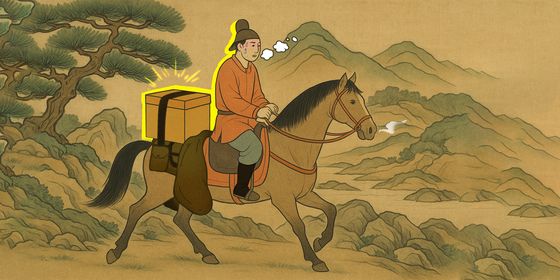From kin to kindred, a character that connects people and brings them together
If 同志 (tóngzhì, comrade) was the most ubiquitous form of address in the revolutionary past—and has since been appropriated by the LGBT community—then 亲 (qīn) may be the modern equivalent, at least among young urban women. Often used by Taobao merchants chatting with customers online, it is short for 亲爱的 (qīn'ài de), or “dear, beloved, cherished.” In the UK or US, a similar term might be “love” or “hon”—a platonic term of endearment, often used by coworkers or new acquaintances, to help close distances and facilitate communication.
The character’s evolution followed a similar path as to how we form social connections in life: We are born with blood ties and, from there, make friends, and build various relationships. First and foremost, 亲 refers to one’s parents, or 双亲 (shuāngqin): 母亲 (mǔqīn, mother) and 父亲 (fùqin, father). Confucianism views blood kinship as the foundation of society, and over the years, various adherents have promulgated exemplars of filial piety, but not all are exactly shining models to follow—one tale features a poverty-stricken couple, who plan to kill their son in order to save food for the husband’s mother. Luckily, the child survives, as the gods instead reward the couple’s “virtue” with an urn full of gold.
Another story, that’s thankfully more lighthearted, concerns an old man in his 70s, who often dressed flamboyantly to appear young in front of his parents—so they could take their minds off their own age. The story coined the term 彩衣娱亲 (cǎiyī yú qīn, wear colorful clothes to please parents, or simply, “to entertain one’s parents”).
One’s biological offspring and siblings are definitely 亲, such as in 亲兄弟 (qīnxiōngdì, biological brother). To stress the biological bond, use 亲生 (qīnshēng), such as in 亲生子女 (qīnshēng zǐnǚ, biological children). Similarly, biological parents are 亲生父母 (qīnshēng fùmǔ), while adoptive parents are called 养父母 (yǎngfùmǔ).
Mostly referring to blood relations, 亲 can also sometimes mean relations through marriage, as in 姻亲 (yīnqīn) or “in-laws.” Though the phrase 相亲 (xiāngqīn) is roughly translated as “blind date” today, it actually started as an arranged meeting in which a man’s parents would assess and hopefully approve a prospective wife for him.
In other phrases, 亲 also refers to relatives in general, such as 亲戚 (qīnqi, relatives), 亲属 (qīnshǔ, kinsfolk), 亲友 (qīnyǒu, family and friends). The warm and loving feelings one shares with relatives are 亲情 (qīnqíng). But sometimes, we also say 远亲不如近邻 (yuǎnqīn bùrú jìnlín, “a close neighbor means more than a distant relative”), since one’s neighbors may be better able to extend a helping hand in times of need, compared to distant kin.
To some, guanxi (关系, “connections” or “relationships”) is regarded as a “mysterious” Chinese cultural element, though, in fact, nepotism or favoritism are hardly unique to China or Asia. Although there are elements of guanxi that are arguably exceptional, the term is rarely understood that way, and nor does guanxi always guarantee special treatment, such as in the phrase 六亲不认 (liù qīn bú rèn, “refuse to acknowledge one’s closest relatives”), which describes a person who does not play favorites with anyone.
Another folk saying goes, 亲兄弟,明算账 (qīnxiōngdì, míng suànzhàng, “even between biological brothers, financial matters should be settled clearly”). A fair and impartial attitude is always to be encouraged in matters of justice, as the phrase 大义灭亲 (dà yì miè qīn, “punish one’s own relatives in the cause of justice”) describes.
Of course, in real life, 任人唯亲 (rèn rén wéi qīn, “appointing people by favoritism”) remains a common occurrence, but its equal and opposite also exists, at least in ancient history: According to a legend of the Spring and Autumn period (770 – 476 BCE), when the lord of the Jin state asked his official Qi Huangyang to propose a candidate for provincial chief, Qi recommended his own enemy. The lord later asked him to find a general for the army, and Qi recommended his own son. In both cases, Qi explained: “You asked for an appropriate candidate for the position, which has nothing to do with whether they are my enemy or my son.” The tale give rise to the phrase 举贤不避亲仇 (jǔ xián bú bì qīn chóu), which means “recommend whoever is capable, family or foe.”
Later, 亲 came to mean people who are close to you, but not necessarily related by blood, such as in 亲如手足 (qīn rú shǒu zú, “as dear as a brother”), and 亲近 (qīnjìn, “be close to”). It is also used to describe sentimental feelings, as in 亲热 (qīnrè, affectionate) and 亲切 (qīnqiè, warm and kindly). Along the same lines, as a verb, 亲 means “kiss,” short for 亲吻 (qīnwěn). For instance, 她亲了小猫一下 (tā qīn le xiǎomāo yíxià “She gave the kitty a kiss”).
Finally, 亲 can also refer to oneself, meaning “personally, in person,” as in 亲自 (qīnzì) or 亲身 (qīnshēn). For example, 这是他的亲身经历 (Zhè shì tā de qīnshēn jīnglì “This event was his personal experience”).
Whether it’s family or friends, 亲 is about those who are, in some way, close to you. Hopefully, the meaning of this character will keep expanding, because, in the end, we are all in this life together.
On the Character: 亲 is a story from our issue, “Modern Family.” To read the entire issue, become a subscriber and receive the full magazine.













